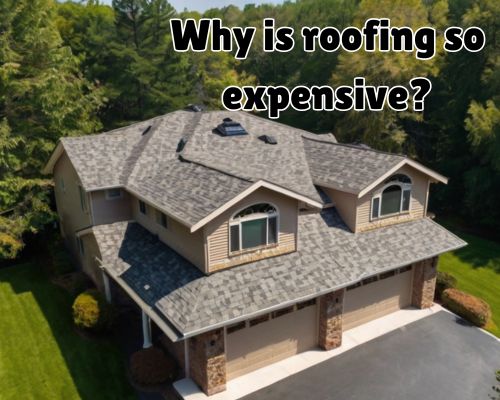Roofing is one of the most vital aspects of home construction and maintenance, yet many homeowners are shocked when they receive a roofing estimate. The question echoes across neighborhoods from Newark to Princeton: “Why is roofing so expensive?” In New Jersey, where weather extremes and local regulations intersect, roofing costs are often higher than anticipated.

Understanding Roofing Costs: More Than Just Shingles
To truly understand the price tag attached to roof replacements or repairs in New Jersey, you have to look beyond the visible. Roofing is not just about slapping shingles on top of a house—it’s a system that includes:
- Decking (underlayment)
- Ventilation systems
- Insulation and flashing
- Gutter integration
- Permits and inspections
Each of these components adds to the complexity—and cost—of a roofing project.
1. Labor Costs in New Jersey
Labor is one of the largest contributors to roofing expenses. The roofing industry in New Jersey demands skilled laborers due to the intricacies of roofing in four-season climates. According to HomeAdvisor and local contractor directories like Angi, the average hourly rate for roofing labor in New Jersey can range from $60 to $100 per hour, depending on experience, certifications, and demand.
Skilled Labor Shortages
There is a growing shortage of skilled tradespeople in New Jersey. Roofing contractor often have to pay a premium to retain licensed professionals who are OSHA-certified and experienced in steep-slope or flat-roof installations. This trickles down into the total project cost.
2. Materials Have Skyrocketed in Price
Material costs have surged in recent years, with inflation, supply chain disruptions, and increased demand all playing a role.
Key Materials and Their Price Increases:
- Asphalt shingles, the most common roofing material in New Jersey, have seen price hikes of 30–40% since 2020.
- Metal roofing, although more durable, costs about $8–$16 per square foot installed.
- Underlayment, sealants, and ventilation systems have all jumped in price due to increased oil and transportation costs.
New Jersey residents also lean toward higher-grade architectural shingles or impact-resistant materials due to hurricanes and nor’easters. These premium options significantly boost the cost.
3. Weather-Related Challenges
In a state like New Jersey, with its humid summers, snowy winters, and year-round precipitation, the weather directly affects roofing practices and timelines.
- Winter installations are slower and may require heating equipment.
- Spring and fall, although ideal for roofing, are high-demand seasons, often increasing contractor rates.
- Emergency repairs after hail or storm damage, especially near the coast (e.g., in Atlantic City or Toms River), carry premium charges.
4. Building Codes and Permitting in New Jersey
New Jersey has stringent building codes, particularly for roofing systems, to protect homes from wind uplift, water infiltration, and fire risk.
Permit Costs
Depending on the township, a roofing permit in New Jersey can cost anywhere from $150 to $500. Towns like Edison, Trenton, and Jersey City may require inspections before, during, and after the job, further complicating timelines and costs.
Code Compliance
Modern roofs must meet insulation standards (R-value), proper ventilation specifications, and fire classifications. Installing or retrofitting to meet these codes isn’t optional—it’s the law. And it adds to the overall price tag.
5. Insurance, Licensing, and Liability
Legitimate New Jersey roofing contractor carry:
- General liability insurance
- Workers’ compensation
- State licensing or registration
These protections benefit homeowners—but they also add overhead for the contractor. Fly-by-night operators might quote cheaper rates, but they often skip this coverage, leaving homeowners at risk for liabilities and substandard work.
6. Disposal and Cleanup Fees
Tearing off an old roof means removing and disposing of hundreds (if not thousands) of pounds of materials.
- Dumpster rentals in NJ range from $300 to $700 depending on size and duration.
- Landfill disposal fees for roofing shingles (classified as construction debris) vary by county but average $75–$120 per ton.
This isn’t just about hauling trash—it’s about handling regulated materials responsibly and legally.
7. Property Size and Roof Complexity
A simple 1,500 sq ft ranch-style home in Cherry Hill will cost far less to reroof than a 3,000 sq ft Victorian in Montclair with dormers, valleys, and steep pitches.
Roof Complexity Factors:
- Pitch (steepness) – requires harnesses and additional labor time.
- Skylights, chimneys, or solar panels – add hours or days to the job.
- Multiple layers of old roofing – must often be removed by code, especially in towns like Hoboken.
8. Hidden Repairs: Rotten Decking, Mold & More
Once the old roof is removed, contractors often discover rotted plywood, water damage, or mold growth. These must be addressed before new materials can be installed—adding hundreds or even thousands of dollars to your final bill.
In coastal towns like Long Branch or inland areas with high humidity like Freehold, these issues are especially common due to moisture retention and poor ventilation.
9. Market Demand and Timing
In peak seasons (spring and fall), demand outpaces supply. New Jersey roofing companies often book out weeks or even months in advance.
Homeowners needing quick turnarounds—especially after storms or when selling their home—may face “rush charges” or higher pricing due to limited availability.
10. The Value of Long-Term Investment
While the upfront cost of roofing in New Jersey might seem daunting, it’s a high-ROI home improvement. According to Remodeling Magazine’s Cost vs. Value Report, a new roof can return up to 68% of its cost in added resale value. Moreover, energy-efficient roofing materials can reduce heating and cooling bills, making it a functional and financial asset.
Conclusion: Roofing Costs Are High for Good Reason
So, why is roofing so expensive in New Jersey? It boils down to:
- High labor costs
- Expensive materials
- Complex weather conditions
- Strict local building codes
- Insurance and liability compliance
- Disposal regulations
- Unseen damage and repair needs
- Market timing and seasonal demand
Homeowners from Paramus to Cape May must weigh the risks of cutting corners against the security of hiring reputable, licensed contractors. While it’s tempting to go for the lowest quote, roofing is one area where you truly get what you pay for.
Local Tip for NJ Homeowners:
If you’re considering a roof replacement in New Jersey, get at least three estimates, ensure contractors are licensed and insured, and verify local references. Don’t forget to ask if they include permits, inspections, and disposal fees in their quotes—it can save you from costly surprises.
